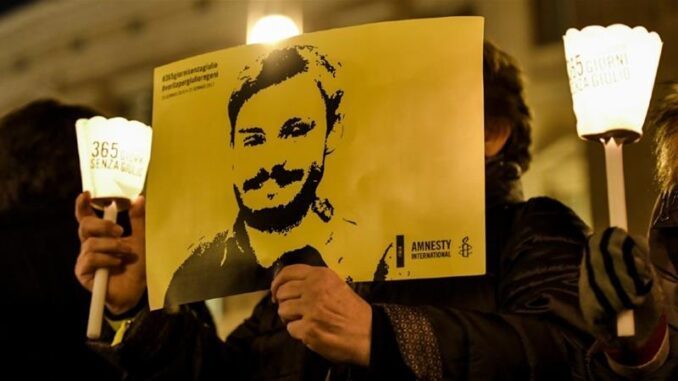
Ten years after the Arab Spring, the investigation of Giulio Regeni’s death offers a telling reminder of repression in the Middle East, according to a Bloomberg recent opinion.
On the 10th anniversary of Tunisian fruit vendor Mohamed Bouazizi’s self-immolation, the desperate act of defiance that set off the Arab Spring will be on the minds of many throughout the Middle East. For most of them, it will be a day of looking back in despair, writes the Bloomberg columnist Bobby Ghosh.
Of all the countries that experienced the flowering of democratic possibilities in that season of hope, only Bouazizi’s has managed to preserve the gains won by popular protest.
Nowhere will the despondency be deeper than in Egypt, which had two-and-a-half years to enjoy the fruits of democracy before they were snatched away by General Abdel-Fattah El-Sisi’s 2013 counterrevolution.
The Egyptians had their own Bouazizi: A young Alexandria businessman named Khaled Said, who was beaten to death by police. A Facebook page created to draw attention to the case spawned the slogan “We are all Khaled Said,” which helped to rally the millions who took over Cairo’s Tahrir Square and other public spaces across the country. They would eventually bring down President Hosni Mubarak on Feb. 11, 2011, marking the zenith of the Arab Spring.
Ten years on, Egyptians scarcely need reminding of the vicious brutality of the state’s security agencies. Human-rights groups say torture and beatings of the kind inflicted on Khaled Said are commonplace. The death of a prisoner at the hands of their captors attracts little attention in Egypt, much less abroad.
There is one signal exception, though: the case of Giulio Regeni. Last week, prosecutors in Rome charged four members of Egypt’s notorious National Security Agency with the kidnapping and murder of the Italian student in Cairo four years ago.
Regeni’s body was found on the outskirts of the Egyptian capital, bearing signs of torture — broken bones, missing teeth and cigarette burns. Prosecutors say eyewitnesses have provided graphic detail of his treatment by the NSA.
Egyptian officials repeatedly dissimulated about what happened to the student, claiming variously that he had been killed in a car accident, by a criminal gang and in a sex party. Under international pressure, Cairo agreed to a joint investigation into the death, but the effort stalled two years ago, when the Egyptians stopped cooperating with their Italian counterparts. A week before the Italians announced charges, a Cairo prosecutor said the case was being suspended, claiming “insufficient evidence.”
The case cast a pall over relations between the two countries. A large Italian business delegation cut short its visit to Egypt in the days after Regeni’s body was found. Two years later, dissatisfaction with the investigation’s lack of progress led the Italian Chamber of Deputies to sever ties with the Egyptian parliament. More recently, a $1.1 billion sale of two Italian frigates to the Egyptian navy was held up as Foreign Minister Luigi Di Maio assured parliament that Rome would wait for final results of the investigation.
With last week’s announcement from the prosecutors, Italy is now at a fork in the road. It can follow the example of France, whose President Emmanuel Macron has declined to make arms sales to Egypt conditional on the Sisi government’s human-rights record. (For good measure, Macron surreptitiously presented the general-turned-president with France’s highest honor.)
Or it can do the right thing by Giulio Regeni and, by extension, the tens of thousands of Egyptians repressed by the Sisi government.
Rome has more clout than Paris in Cairo. Italy is a much larger Egyptian trading partner. Italian participation is essential for Sisi to realize his dream of turning Egypt into a regional energy hub. Italy is a member of the East Mediterranean Gas Forum, a new Cairo-based body meant to promote cooperation over natural gas.
Now may be an especially propitious time for Italy to use its leverage. Sisi’s chief international patron, President Donald Trump, is on his way out; for all his indulgences, Macron cannot provide the same political cover. President-elect Biden is unlikely to regard Sisi as his “favorite dictator.” Antony Blinken, Biden’s nominee for secretary of state, has already expressed concern over human rights in Egypt.
Italy, then, has the chance to give new life to the Arab Spring’s 10-year-old slogan, and make “We are all Giulio Regeni” its watchword for dealing with Sisi on human rights. Egyptians would doubtless welcome even a little respite from the repression they’ve endured over the last decade, and the wider Arab world would be the better for it as well.



